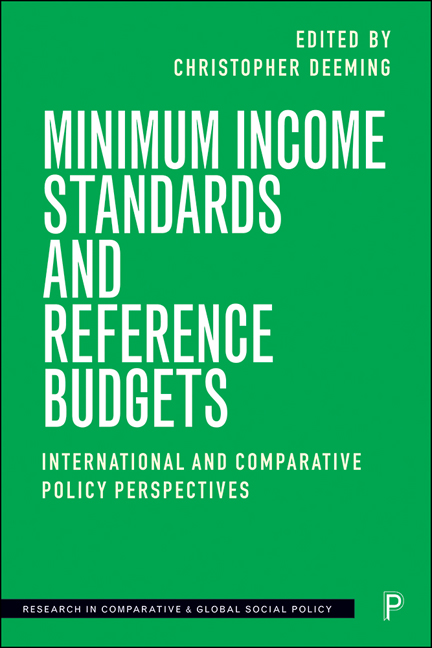22 - Minimum Income Standards in the Basic Income Debate
Published online by Cambridge University Press: 12 March 2021
Summary
Introduction
The now lively debate about Basic Income –an unconditional income for every individual –is seeing the term ‘Basic Income’ used in a variety of ways. The diversity that this chapter will explore relates to the diversity between those usages that state or imply unconditional incomes paid at particular levels, and those that do not. The feasibilities of different levels will be discussed, and in particular the feasibility of paying Basic Incomes at levels defined by published Minimum Income Standard (MIS) reports.
Basic Income
A Basic Income (sometimes called a Citizen's Income, a Universal Basic Income or a Citizen's Basic Income) is an unconditional income paid to every individual. Sometimes explanatory additions will be found. For instance, ‘non-withdrawable’ might be added to the definition (Citizen's Basic Income Trust), in the sense that as earned income rises, the Basic Income is not withdrawn. ‘Unconditional’ already implies this: except that unfortunately ‘unconditional’ has been used by some participants in the debate to mean simply ‘not work-tested’ rather than ‘without any conditions’ (Young, 2018: 16, 22), which is why it is now wise to add ‘non-withdrawable’ to the definition. Further additions are sometimes made in order to clarify aspects of Basic Income that might or might not be assumed by readers: for instance, that the income is ‘in cash’ and ‘periodic … paid at regular intervals (for example, every month)’, according to the Basic Income Earth Network (BIEN) (BIEN, 2020), the former addition ensuring that the Basic Income is understood as money and not services, and as cash and not vouchers with restricted spending options, and the latter distinguishing Basic Income from the annual and varying Alaskan Permanent Fund Dividend (Widerquist and Howard, 2012).
While it is of course true that any individual or organisation has every right to employ a phrase to mean exactly what they wish it to mean, for a debate to be rational there has to be some kind of agreement over definitions.
- Type
- Chapter
- Information
- Minimum Income Standards and Reference BudgetsInternational and Comparative Policy Perspectives, pp. 319 - 330Publisher: Bristol University PressPrint publication year: 2020

